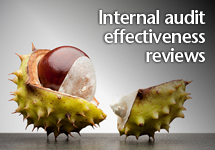Competency framework
The Chartered IIA's CPE policy changed on 1 April 2017. Read more here |
This framework outlines the 48 key competencies that are used on the Chartered IIA's CPD planner for 2016–17.
It allows members to assess their competence in these areas and plan their CPD accordingly. The competencies fall into four areas:
- Internal audit standards, theory and methodology
- Knowledge areas
- Interpersonal skills
- Tools and techniques
1. Internal audit standards, theory and methodology
International Professional Practices Framework
- Applies the relevant portions of the International Professional Practices Framework
2. Knowledge areas
The internal environment
- Applies an understanding of the technical aspects of finance and accounting appropriate to their own or clients' organisation when communicating with others
- Applies an understanding of management accounting appropriate to their own or clients' organisation when communicating with others
- Applies an understanding of organisational and management theory to own or clients' organisation
The external environment
- Applies an understanding of the regulatory and legal framework within which their own or clients' organisation operates
- Applies an understanding of macro- and micro-economics appropriate to the organisation when communicating with others
Quality and control
- Applies a range of appropriate quality models and frameworks
- Demonstrates an understanding of the principles of ethics and integrity
- Identifies the risk of fraud occurring and the appropriate means for detection, investigation and prevention
- Applies an understanding of IT risk, control and security appropriate to own or clients' organisation when communicating with others
- Applies an understanding of risk management, control and governance through the delivery of assurance
- Maintains effective working relationships with other assurance providers
3. Interpersonal skills
Personal effectiveness
- Develops and wields influence effectively
- Develops and implements organisational policies and procedures effectively
- Develops and exploits effective working relationships
- Operates effectively through proactive collaboration
Communication
- Communicates effectively both orally and in writing to a range of audiences
- Promotes open communication
- Advocates the internal audit function to others
Managing others
- Manages staff effectively
- Builds and inspires a team
- Manages and resolves conflict
- Leads a team effectively
Managing performance
- Manages performance effectively
- Manages own workload and that of team effectively
Managing change
- Acts as a champion for change
- Responds positively to change
4. Tools and techniques
Research and investigation
- Selects and applies a range of appropriate operational and management research tools and techniques
- Identifies the need for an expert in operational research as required and validates their work
- Selects and applies a range of appropriate forecasting tools and techniques
- Identifies the need for an expert in forecasting as required and validates their work
Business processes and project management
- Manages projects within the internal audit function or organisation effectively
- Selects and applies a range of appropriate business process analysis tools and techniques
- Organises and leads a team in mapping, analysis, and business process improvement
- Uses performance management techniques to monitor and evaluate operational and strategic performance
Risk and control
- Explains and applies risk theory and management, control design and control testing techniques
- Explains and applies internal controls and a range of control frameworks
- Trains others in control model used
Data collection and analysis
- Applies sampling, data analysis and other statistical techniques to analyse and assess data
- Uses benchmarking data adequately
- Uses data extraction software and communicates data manipulation requirements to others
- Prepares for an interview/meeting, sets the environment, and conducts the interview/meeting
- Designs and uses questionnaires and surveys effectively
- Identifies the need for a specific expert in the data mining/analysis field
Problem solving
- Selects and applies a range of problem solving techniques
- Identifies the need for a specific expert/facilitator in the problem solving field
Information technology
- Uses Microsoft office suite or equivalent effectively
- Uses a range of packages for data extraction, analysis and audit management






